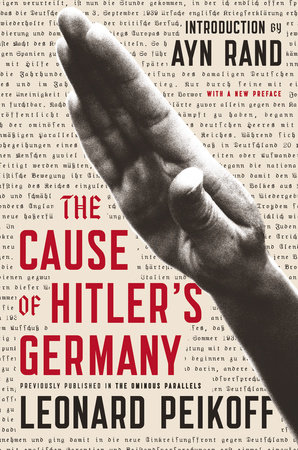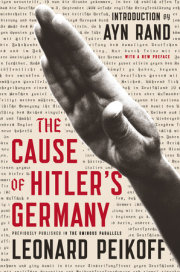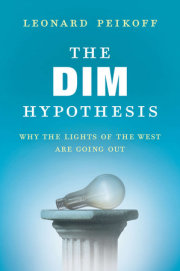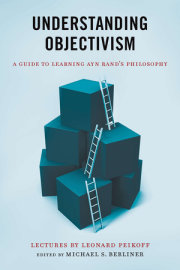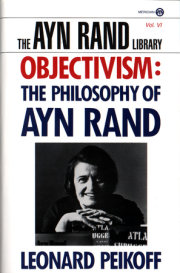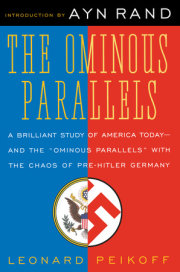PREFACE
As Ayn Rand indicates in her introduction, this book demonstrates how German philosophy led to Hitler and the Holocaust.
The Cause of Hitler’s Germany is about two-thirds of The Ominous Parallels, a book of mine first published in 1982. In the book, I intended a warning: If Americans continue to accept and act on the same philosophic ideas that led to the Third Reich, then America will have to follow a parallel course and suffer the same result.
The book, accordingly, studied American culture and history in as much detail as that given to Germany. Given our cultural state, however, I did not expect any such warning to be heeded or even heard, and it wasn’t. There is no improvement in the thirty years since, no change in the basic ideas ruling the United States (and the West as a whole). The Soviet Empire has collapsed, but the ideas of irrationalism, self-sacrifice, and collectivism still dominate and fuel murderous tyrannies, primarily now in the upsurging Middle East, but elsewhere, too.
Unlike The Ominous Parallels, this substantial portion of it is offered not primarily as a warning but rather as an explanation. To this day, Nazism remains vivid in the public mind as the greatest evil in human history, and continues to be the subject or background of countless novels, films, and nonfiction analyses. But the artists and scholars still have no real explanation; they are no closer than they were in 1982 to identifying the fundamental roots of Nazism.
For this reason, I agreed with the suggestion of Dr. Michael Berliner that I bring out this reduced version of my book. It was Dr. Berliner who first thought of such a possibility, who initiated the project, and who oversaw the development of its various stages. He wanted a book that would focus only on the Nazi aspects: on their intellectual origins in German philosophy, and then on their manifestations in Weimar culture and, as a result, in the world of Hitler. My approach to discovering the cause of Nazism is, I believe, unique and worthy of special attention; I am hopeful that this time it may reach its audience. If we are to survive today’s world, some—and ever more—people must come to understand that abstract theory is what produces existential consequences, both personal and social.
Eleven of the sixteen chapters of The Ominous Parallels are included in this book. In omitting the other five chapters, I have eliminated a great deal: the material, analyzing our country’s decline into an intellectually Germanized culture, thereby showing how and why the mind of the Enlightenment gave way to religion, pragmatism, and nihilism, all of it expressed by the shrinking of “Americanism” in our public’s attitude, and by the ever-growing scale and power of our government. The solution, I argued, is to replace the philosophy of Kant and Hegel with the pro-reason, pro-individualism viewpoint of Ayn Rand.
I have made some minuscule changes to the original wording, cutting out a few lines here and there that refer to the omitted chapters.
Leonard Peikoff
Aliso Viejo, California
February 2013
P.S. If, after reading this book, you are interested in a broader and deeper discussion of the relationship between philosophy and culture/politics, I refer you to my latest book: The DIM Hypothesis: Why the Lights of the West Are Going Out (2012). But this book is technical and requires some background, so read the one in your hands first.
From Ayn Rand’s 1980 Introduction to
THE OMINOUS PARALLELS
It gives me great pleasure to introduce the first book by an Objectivist philosopher other than myself.
Perhaps the best recommendation I can give this book—and its author, Dr. Leonard Peikoff—is to say that it and he are not of today’s cultural mainstream. They will be part of tomorrow’s.
It is not necessary for me to prove that something is wrong with today’s world. Everybody—of any creed, color, or intellectual persuasion, old and young, rich and poor, conservative and liberal, foreign and domestic—senses that something monstrous is destroying the world. But no one knows what it is, and people keep blaming one another—with some justice.
As a symptom of today’s cultural anxiety, observe the unusual interest in and the deluge of books dealing with Nazi Germany. Every sort of semi-plausible and wholly impossible theory has been offered in futile attempts to find the cause and explain the rise of Nazism. The failure of those explanations intensifies the quest: men seem to sense that the collapse of what had been a civilized country into such monstrous evil must be understood if we are to make certain that it will not be repeated. “We dare not brush aside unexplained a horror such as Nazism,” states Dr. Peikoff. If we do not know its causes, how can we be sure that our own country is not traveling the same road?
Dr. Peikoff answers these questions. He identifies the cause of Nazism. . . . He demonstrates that there is a science which has been all but obliterated in the modern world. “Yet this science determines the destiny of nations and the course of history . . . ,” he writes. “It is the science which had to be destroyed, if the catastrophes of our time were to become possible. The science is philosophy.”
The non-modern (and non-old-fashioned) aspect of Leonard Peikoff’s book is the breadth of his vision and the stunning scale of his philosophic integration. He does not share the concrete-bound, college-induced myopia of those alleged philosophers who study the various meanings of the word “but” (the contemporary empiricists)—nor does he share the foggy stumbling and the floating abstractions of their predecessors (the rationalists). He presents the history of Germany’s philosophy, in telling essentials. . . . Then he presents the practical results—the way in which philosophic ideas direct the course and shape the particular events of the history of [the Weimar Republic], as reflected in politics, economics, art, literature, education, etc.
This last is the cardinal achievement of Dr. Peikoff s book. While today’s philosophy departments make it a loud point to proclaim that philosophy has nothing to do with practical life or with reality (which, they add, does not exist)—Dr. Peikoff shows to their mangled victims what philosophy is, what it does, and how to recognize its influence all around us. He gives a virtuoso performance of shuttling effortlessly between abstractions and concretes—keeping the first tied firmly to reality and thus illuminating the second. He shows that a nation brought up to regard the principles of duty and self-sacrifice as cardinal virtues will be helpless when confronted by a gang of thugs who demand obedience and self-sacrifice.
It is a tragic irony of our time that the two worst, bloodiest tribes in history, the Nazis of Germany and the Communists of Soviet Russia, both of whom are motivated by brute power-lust and a crudely materialistic greed for the unearned, show respect for the power of philosophy (they call it “ideology”) and spend billions of their looted wealth on propaganda and indoctrination, realizing that man’s mind is their most dangerous enemy and it is man’s mind that they have to destroy, while the United States and the other countries of the West, who claim to believe in the superiority of the human spirit over matter, neglect philosophy, despise ideas, starve the best minds of the young, offer nothing but the stalest slogans of a materialistic altruism in the form of global giveaways, and wonder why they are losing the world to the thugs.
As an example of why the cause of Nazism should be understood (but is not), I would like to mention a recent television interview with Helmut Schmidt, chancellor of West Germany. Asked to name his favorite philosopher, he answered—in a changed tone of voice, a stiff, solemn, deaf-and-blind, heel-clicking tone—“Marcus Aurelius. He taught that we must do our duty above all.” If he is typical of his country (and I believe he is), Germany has learned nothing.
The ineffable monster destroying the world is not an entity but a vacuum, an absence, the emptiness left by the collapse of philosophy. In that lightless emptiness, mindless men rattle frantically, bumping into one another, seeking desperately some way to exist on earth—which they cannot find without the tool they have discarded. This leads to phenomena such as Nazi Germany or Soviet Russia, as Dr. Peikoff demonstrates.
If you do not wish to be a victim of today’s philosophical bankruptcy, I recommend The Ominous Parallels as protection and ammunition. It will protect you from supporting, unwittingly, the ideas that are destroying you and the world. It will bring order into the chaos of today’s events—and show you simultaneously the enormity of the battle and the contemptible smallness of the enemy.
The Ominous Parallels offers a truly revolutionary idea in the field of the philosophy of history. The book is clear, tight, disciplined, beautifully structured, and brilliantly reasoned. Its style is clear and hard as crystal—and as sparkling. If you like my works, you will like this book.
As to my personal reaction, I can express it best by paraphrasing a line from Atlas Shrugged: “It’s so wonderful to see a great, new, crucial achievement which is not mine!”
Ayn Rand
New York, November 1980
1 The Cause of Nazism
Here is the theory:
“It is thus necessary that the individual should finally come to realize that his own ego is of no importance in comparison with the existence of his nation; that the position of the individual ego is conditioned solely by the interests of the nation as a whole . . . that above all the unity of a nation’s spirit and will are worth far more than the freedom of the spirit and will of an individual. . . .”
“This state of mind, which subordinates the interests of the ego to the conservation of the community, is really the first premise for every truly human culture. . . . The basic attitude from which such activity arises, we call—to distinguish it from egoism and selfishness—idealism. By this we understand only the individual’s capacity to make sacrifices for the community, for his fellow men.”
These statements were made in our century by the leader of a major Western nation. His countrymen regarded his viewpoint as uncontroversial. His political program implemented it faithfully.
The statements were made by Adolf Hitler. He was explaining the moral philosophy of Nazism.1
And here is the ultimate practice (as described by William Shirer in The Rise and Fall of the Third Reich):
“The gas chambers themselves [at Auschwitz] and the adjoining crematoria, viewed from a short distance, were not sinister-looking places at all; it was impossible to make them out for what they were. Over them were well-kept lawns with flower borders; the signs at the entrances merely said BATHS. The unsuspecting Jews thought they were simply being taken to the baths for the delousing which was customary at all camps. And taken to the accompaniment of sweet music!
“For there was light music. An orchestra of ‘young and pretty girls all dressed in white blouses and navy-blue skirts,’ as one survivor remembered, had been formed from among the inmates. While the selection was being made for the gas chambers this unique musical ensemble played gay tunes from The Merry Widow and Tales of Hoffmann. Nothing solemn and somber from Beethoven. The death marches at Auschwitz were sprightly and merry tunes, straight out of Viennese and Parisian operetta.
“To such music, recalling as it did happier and more frivolous times, the men, women and children were led into the ‘bath houses,’ where they were told to undress preparatory to taking a ‘shower.’ Sometimes they were even given towels. Once they were inside the ‘shower-room’—and perhaps this was the first moment that they may have suspected something was amiss, for as many as two thousand of them were packed into the chamber like sardines, making it difficult to take a bath—the massive door was slid shut, locked and hermetically sealed. Up above where the well-groomed lawn and flower beds almost concealed the mushroom-shaped lids of vents that ran up from the hall of death, orderlies stood ready to drop into them the amethyst-blue crystals of hydrogen cyanide. . . .
“Surviving prisoners watching from blocks nearby remembered how for a time the signal for the orderlies to pour the crystals down the vents was given by a Sergeant Moll. ‘Na, gib ihnen schon zu fressen’ (‘All right, give ’em something to chew on’), he would laugh and the crystals would be poured through the openings, which were then sealed.
“Through heavy-glass portholes the executioners could watch what happened. The naked prisoners below would be looking up at the showers from which no water spouted or perhaps at the floor wondering why there were no drains. It took some moments for the gas to have much effect. But soon the inmates became aware that it was issuing from the perforations in the vents. It was then that they usually panicked, crowding away from the pipes and finally stampeding toward the huge metal door where, as Reitlinger puts it, ‘they piled up in one blue clammy blood-spattered pyramid, clawing and mauling each other even in death.’”2
The Nazis were not a tribe of prehistoric savages. Their crimes were the official, legal acts and policies of modern Germany—an educated, industrialized, civilized Western European nation, a nation renowned throughout the world for the luster of its intellectual and cultural achievements. By reason of its long line of famous artists and thinkers, Germany has been called “the land of poets and philosophers.”
But its education offered the country no protection against the Sergeant Molls in its ranks. The German university students were among the earliest groups to back Hitler. The intellectuals were among his regime’s most ardent supporters. Professors with distinguished academic credentials, eager to pronounce their benediction on the Führer’s cause, put their scholarship to work full time; they turned out a library of admiring volumes, adorned with obscure allusions and learned references.
The Nazis did not gain power against the country’s wishes. In this respect there was no gulf between the intellectuals and the people. The Nazi party was elected to office by the freely cast ballots of millions of German voters, including men on every social, economic, and educational level. In the national election of July 1932, the Nazis obtained 37 percent of the vote and a plurality of seats in the Reichstag. On January 30, 1933, in full accordance with the country’s legal and constitutional principles, Hitler was appointed chancellor. Five weeks later, in the last (and semi-free) election of the pre-totalitarian period, the Nazis obtained 17 million votes, 44 percent of the total.
The voters were aware of the Nazi ideology. Nazi literature, including statements of the Nazi plans for the future, papered the country during the last years of the Weimar Republic. Mein Kampf alone sold more than 200,000 copies between 1925 and 1932. The essence of the political system which Hitler intended to establish in Germany was clear.
In 1933, when Hitler did establish the system he had promised, he did not find it necessary to forbid foreign travel. Until World War II, those Germans who wished to flee the country could do so. The overwhelming majority did not. They were satisfied to remain.
The system which Hitler established—the social reality which so many Germans were so eager to embrace or so willing to endure—the politics which began in a theory and ended in Auschwitz—was: the “total state.” The term, from which the adjective “totalitarian” derives, was coined by Hitler’s mentor, Mussolini.
The state must have absolute power over every man and over every sphere of human activity, the Nazis declared. “The authority of the Führer is not limited by checks and controls, by special autonomous bodies or individual rights, but it is free and independent, all-inclusive and unlimited,” said Ernst Huber, an official party spokesman, in 1933.
“The concept of personal liberties of the individual as opposed to the authority of the state had to disappear; it is not to be reconciled with the principle of the nationalistic Reich,” said Huber to a country which listened, and nodded. “There are no personal liberties of the individual which fall outside of the realm of the state and which must be respected by the state. . . . The constitution of the nationalistic Reich is therefore not based upon a system of inborn and inalienable rights of the individual.”3
If the term “statism” designates concentration of power in the state at the expense of individual liberty, then Nazism in politics was a form of statism. In principle, it did not represent a new approach to government; it was a continuation of the political absolutism—the absolute monarchies, the oligarchies, the theocracies, the random tyrannies—which has characterized most of human history.
In degree, however, the total state does differ from its predecessors: it represents statism pressed to its limits, in theory and in practice, devouring the last remnants of the individual. Although previous dictators (and many today; e.g., in Latin America) often preached the unlimited power of the state, they were on the whole unable to enforce such power. As a rule, citizens of such countries had a kind of partial “freedom,” not a freedom-on-principle, but at least a freedom-by-default.
Even the latter was effectively absent in Nazi Germany. The efficiency of the government in dominating its subjects, the all-encompassing character of its coercion, the complete mass regimentation on a scale involving millions of men—and, one might add, the enormity of the slaughter, the planned, systematic mass slaughter, in peacetime, initiated by a government against its own citizens—these are the insignia of twentieth-century totalitarianism (Nazi and communist), which are without parallel in recorded history. In the totalitarian regimes, as the Germans found out after only a few months of Hitler’s rule, every detail of life is prescribed, or proscribed. There is no longer any distinction between private matters and public matters. “There are to be no more private Germans,” said Friedrich Sieburg, a Nazi writer; “each is to attain significance only by his service to the state, and to find complete self-fulfillment in this service.” “The only person who is still a private individual in Germany,” boasted Robert Ley, a member of the Nazi hierarchy, after several years of Nazi rule, “is somebody who is asleep.”4
In place of the despised “private individuals,” the Germans heard daily or hourly about a different kind of entity, a supreme entity, whose will, it was said, is what determines the course and actions of the state: the nation, the whole, the group. Over and over, the Germans heard the idea that underlies the advocacy of omnipotent government, the idea that totalitarians of every kind stress as the justification of their total states: collectivism.
Collectivism is the theory that the group (the collective) has primacy over the individual. Collectivism holds that, in human affairs, the collective—society, the community, the nation, the proletariat, the race, etc.—is the unit of reality and the standard of value. On this view, the individual has reality only as part of the group, and value only insofar as he serves it; on his own he has no political rights; he is to be sacrificed for the group whenever it—or its representative, the state—deems this desirable.
Fascism, said one of its leading spokesmen, Alfredo Rocco, stresses
the necessity, for which the older doctrines make little allowance, of sacrifice, even up to the total immolation of individuals, in behalf of society. . . . For Liberalism [i.e., individualism], the individual is the end and society the means; nor is it conceivable that the individual, considered in the dignity of an ultimate finality, be lowered to mere instrumentality. For Fascism, society is the end, individuals the means, and its whole life consists in using individuals as instruments for its social ends.5
“[T]he higher interests involved in the life of the whole,” said Hitler in a 1933 speech, “must here set the limits and lay down the duties of the interests of the individual.” Men, echoed the Nazis, have to “realize that the State is more important than the individual, that individuals must be willing and ready to sacrifice themselves for Nation and Führer.” The people, said the Nazis, “form a true organism” a “living unity,” whose cells are individual persons. In reality, therefore—appearances to the contrary notwithstanding—there is no such thing as an “isolated individual” or an autonomous man.6
Just as the individual is to be regarded merely as a fragment of the group, the Nazis said, so his possessions are to be regarded as a fragment of the group’s wealth.
“Private property” as conceived under the liberalistic economic order was a reversal of the true concept of property [wrote Huber]. This “private property” represented the right of the individual to manage and to speculate with inherited or acquired property as he pleased, without regard for the general interests. . . . German socialism had to overcome this “private,” that is, unrestrained and irresponsible view of property. All property is common property. The owner is bound by the people and the Reich to the responsible management of his goods. His legal position is only justified when he satisfies this responsibility to the community.7
Contrary to the Marxists, the Nazis did not advocate public ownership of the means of production. They did demand that the government oversee and run the nation’s economy. The issue of legal ownership, they explained, is secondary; what counts is the issue of control. Private citizens, therefore, may continue to hold titles to property—so long as the state reserves to itself the unqualified right to regulate the use of their property.
If “ownership” means the right to determine the use and disposal of material goods, then Nazism endowed the state with every real prerogative of ownership. What the individual retained was merely a formal deed, a contentless deed, which conferred no rights on its holder. Under communism, there is collective ownership of property de jure. Under Nazism, there is the same collective ownership de facto.
During the Hitler years—in order to finance the party’s programs, including the war expenditures—every social group in Germany was mercilessly exploited and drained. White-collar salaries and the earnings of small businessmen were deliberately held down by government controls, freezes, taxes. Big business was bled by taxes and “special contributions” of every kind, and strangled by the bureaucracy. (Amid “the Niagara of thousands of special decrees and laws,” writes Shirer, “even the most astute businessman was often lost, and special lawyers had to be employed to enable a firm to function. The graft involved in finding one’s way to key officials . . . became in the late thirties astronomical.”8) At the same time the income of the farmers was held down, and there was a desperate flight to the cities—where the middle class, especially the small tradesmen, were soon in desperate straits, and where the workers were forced to labor at low wages for increasingly longer hours (up to 60 or more per week).
But the Nazis defended their policies, and the country did not rebel; it accepted the Nazi argument. Selfish individuals may be unhappy, the Nazis said, but what we have established in Germany is the ideal system, socialism. In its Nazi usage this term is not restricted to a theory of economics; it is to be understood in a fundamental sense. “Socialism” for the Nazis denotes the principle of collectivism as such and its corollary, statism—in every field of human action, including but not limited to economics.
“To be a socialist,” says Goebbels, “is to submit the I to the thou; socialism is sacrificing the individual to the whole.”9
By this definition, the Nazis practiced what they preached. They practiced it at home and then abroad. No one can claim that they did not sacrifice enough individuals.
The question is: why?
What could explain a system such as Nazism? What permitted it to happen?
An evil of such magnitude cannot be a product of superficial factors. In order to make it, and its German popularity, intelligible, one must penetrate to its deepest, most hidden roots. One must grasp its nature and its causes in terms of fundamentals.
Unfortunately, this has not been the approach of most observers. As a rule, commentators have attempted to explain Nazism by the opposite method: by the newspaper headlines or the practical crises of the moment.
It has been said, for instance, that the Germans embraced Nazism because they lost World War I. Austria lost that war also, but this did not cause it to turn Nazi (it went under only when invaded by Hitler in 1938). Italy, on the other hand, one of the victorious powers at the Versailles Conference of 1919, went Fascist in 1922.
It has been said that the cause of Nazism was the Great Depression. All the industrial nations suffered the ravages of the Depression. Few turned to Nazism.
It has been said that the cause of Nazism was the weakness of the non-totalitarian parties in the Weimar Republic, the pressure-group warfare which they encouraged, and the governmental paralysis that followed. This does not explain why or in what basic respect the non-totalitarians were weak, nor does it take into account the many countries in which social clashes and governmental drifting have not led to Nazism.
There is no direct causal relationship or even any approximate correlation between specific practical crises (singly or in combination) and the development of Nazism. Practical crises confront a country with the need for action. They do not determine what the action will be. In the face of military ruin, economic strangulation, or governmental collapse, men may choose to investigate the disaster’s causes and to discover a more rational course of action for the future, i.e., they may choose to think. Or they may choose to hate, or to pray, or to beg, or to kill. On such matters, the crisis itself is silent.
There are other interpretations of Nazism, besides the “practical crisis” theory.
Religious writers often claim that the cause of Nazism is the secularism or the scientific spirit of the modern world. This evades the facts that the Germans at the time, especially in Prussia, were one of the most religious peoples in Western Europe; that the Weimar Republic was a hotbed of mystic cults, of which Nazism was one; and that Germany’s largest and most devout religious group, the Lutherans, counted themselves among Hitler’s staunchest followers.
There is the Marxist interpretation of Nazism, according to which Hitler is the inevitable result of capitalism. This evades the facts that Germany after Bismarck was the least capitalistic country of Western Europe; that the Weimar Republic from the start was a controlled economy, with the controls growing steadily; and that the word “Nazism” is an abbreviation for “National Socialism.”
There are the Aryan racists in reverse, who say that the cause of Nazism is the “innate depravity” of the Germans. This evades the fact that “depravity” is a moral concept, which implies that man is not predetermined but has free choice. It also evades the fact that regimes similar to Hitler’s, regimes differing only in the degree of brutality they perpetrated, have appeared in our century across the globe—not only in Italy, Japan, Argentina, and the like, but also, in the form of communism, in Russia, China, and their satellites.
Then there is the Freudian interpretation, according to which the cause of Nazism is the Germans’ Oedipus complex or their death wish or their toilet training, etc. This evades the fact that arbitrary constructs, such as Freud is famous for, can be manipulated to “explain” anything, and therefore explain nothing.
We dare not brush aside unexplained a horror such as Nazism. If we are to avoid a fate like that of Germany, we must find out what made such a fate possible. We must find out what, at root, is required to turn a country, Germany or any other, into a Nazi dictatorship; and then we must uproot that root.
We need to look for something deeper than practical conditions, something that dictates men’s view of what constitutes the practical.
In an advanced, civilized country, a handful of men were able to gain for their criminal schemes the enthusiastic backing of millions of decent, educated, law-abiding citizens. What is the factor that made this possible?
Criminal groups and schemes have existed throughout history, in every country. They have been able to succeed only in certain periods. The mere presence of such groups is not sufficient to account for their victory. Something made so many Germans so vulnerable to a takeover. Something armed the criminals and disarmed the country.
Observe in this connection that the Nazis, correctly, regarded the power of propaganda as an indispensable tool.
The Nazis could not have won the support of the German masses but for the systematic preaching of a complex array of theories, doctrines, opinions, notions, beliefs. And not one of their central beliefs was original. They found those beliefs, widespread and waiting, in the culture; they seized upon them and broadcast them at top volume, thrusting them with a new intensity back into the streets of Germany. And the men in the streets heard and recognized and sympathized with and embraced those beliefs, and voted for their exponents.
The Germans would not have recognized or embraced those beliefs in the nineteenth century, when the West was still being influenced by the remnants of the Age of Reason and the Enlightenment, when the doctrines of the rights of man and the autonomy of the individual were paramount. But by the twentieth century such doctrines, and the convictions on which they depended, were paramount no longer.
Germany was ideologically ripe for Hitler. The intellectual groundwork had been prepared. The country’s ideas—a certain special category of ideas—were ready.
There is a science whose subject matter is that category of ideas.
Today, in our colleges, this science has sunk to the lowest point in its history. Its teachers have declared that it has no questions to ask, no method to follow, no answers to offer. As a result, it is disappearing—losing its identity, its intelligibility, its students, and the last vestiges of its once noble reputation. No one—among the intellectuals or the general public—would suspect any longer that this science could be relevant to human life or action.
Yet this science determines the destiny of nations and the course of history. It is the source of a nation’s frame of reference and code of values, the root of a people’s character and culture, the fundamental cause shaping men’s choices and decisions in every crucial area of their lives. It is the science which directs men to embrace this world or to seek out some other that is said to transcend it—which directs them to reason or superstition, to the pursuit of happiness or of self-sacrifice, to production or starvation, to freedom or slavery, to life or death. It is the science which made the difference between the East and the West, between the Middle Ages and the Renaissance, between the Founding Fathers of the new continent and the Adolf Hitlers of the old. It is the science which had to be destroyed, if the catastrophes of our time were to become possible.
The science is philosophy.
Philosophy is the study of the nature of existence, of knowledge, and of values.
The branch of philosophy that studies existence is metaphysics. Metaphysics identifies the nature of the universe as a whole. It tells men what kind of world they live in, and whether there is a supernatural dimension beyond it. It tells men whether they live in a world of solid entities, natural laws, absolute facts, or in a world of illusory fragments, unpredictable miracles, and ceaseless flux. It tells men whether the things they perceive by their senses and mind form a comprehensible reality, with which they can deal, or some kind of unreal appearance, which leaves them staring and helpless.
The branch of philosophy that studies knowledge is epistemology. Epistemology identifies the proper means of acquiring knowledge. It tells men which mental processes to employ as methods of cognition, and which to reject as invalid or deceptive. Above all, epistemology tells men whether reason is their faculty of gaining knowledge, and if so how it works— or whether there is a means of knowledge other than reason, such as faith, or the instinct of society, or the feelings of the dictator.
The branch of philosophy that studies values is ethics (or morality), which rests on both the above branches—on a view of the world in which man acts, and of man’s nature, including his means of knowledge. Ethics defines a code of values to guide human actions. It tells men the proper purpose of man’s life, and the means of achieving it; it provides the standard by which men are to judge good and evil, right and wrong, the desirable and the undesirable. Ethics tells a man, for instance, to pursue his own fulfillment—or to sacrifice himself for the sake of something else, such as God or his neighbor.
The branch of philosophy that applies ethics to social questions is politics, which studies the nature of social systems and the proper functions of government. Politics is not the start, but the product of a philosophic system. By their nature, political questions cannot be raised or judged except on the basis of some view of existence, of values, and of man’s proper means of knowledge.
Since men cannot live or act without some kind of basic guidance, the issues of philosophy in some form necessarily affect every man, in every social group and class. Most men, however, do not consider such issues in explicit terms. They absorb their ideas—implicitly, eclectically, and with many contradictions—from the cultural atmosphere around them, building into their souls without identifying it the various ideological vibrations emanating from school and church and arts and media and mores.
A cultural atmosphere is not a primary. It is created, ultimately, by a handful of men: by those whose lifework it is to deal with, originate, and propagate fundamental ideas. For the great majority of men the influence of philosophy is indirect and unrecognized. But it is real.
The root cause of Nazism lies in a power that most people ignore, disparage—and underestimate. The cause is not the events hailed or cursed in headlines and street rallies, but the esoteric writings of the professors who, decades or centuries earlier, laid the foundation for those events. The symbol of the cause is not the munitions plants or union halls or bank vaults of Germany, but its ivory towers. What came out of the towers in this regard is only coils of obscure, virtually indecipherable jargon. But that jargon is fatal.
“[The Nazi] death camps,” notes a writer in The New York Times, “were conceived, built and often administered by Ph.D.’s.”10
What had those Ph.D.’s been taught to think in their schools and universities—and where did such ideas come from?
2 The Totalitarian Universe
It took centuries and a brain-stopping chain of falsehoods to bring a whole people to the state of Hitler-worship. Modern German culture, including its Nazi climax, is the result of a complex development in the history of philosophy, involving dozens of figures stretching back to the beginnings of Western thought. The same figures helped to shape every Western nation; but in other countries, to varying extents, the results were mixed, because there was also an opposite influence or antidote at work. In Germany, by the turn of the twentieth century, the cultural atmosphere was unmixed; the traces of the antidote had long since disappeared, and the intellectual establishment was monolithic.
If we view the West’s philosophic development in terms of essentials, three fateful turning points stand out, three major philosophers who, above all others, are responsible for generating the disease of collectivism and transmitting it to the dictators of our century.
The three are: Plato—Kant—Hegel. (The antidote to them is: Aristotle.)
Plato is the father of collectivism in the West. He is the first thinker to formulate a systematic view of reality, with a collectivist politics as its culmination. In essence, Plato’s metaphysics holds that the universe consists of two opposed dimensions: true reality—a perfect, immutable, supernatural realm, nonmaterial, nonspatial, nontemporal, nonperceivable—and the material world in which we live. The material world, Plato holds, is only an imperfect appearance of true reality, a semireal reflection or projection of it. (Because Plato’s metaphysics holds that reality is thus fundamentally spiritual or nonmaterial in nature, it is described technically in philosophy as “idealism.”)
The content of true reality, according to Plato, is a set of universals or Forms—in effect, a set of disembodied abstractions representing that which is in common among various groups of particulars in this world. Thus for Plato abstractions are supernatural existents. They are nonmaterial entities in another dimension, independent of man’s mind and of any of their material embodiments. The Forms, Plato tells us repeatedly, are what is really real. The particulars they subsume—the concretes that make up this world—are not; they have only a shadowy, dreamlike half-reality.
Momentous conclusions about man are implicit in this metaphysics (and were later made explicit by a long line of Platonists): since individual men are merely particular instances of the universal “man,” they are not ultimately real. What is real about men is only the Form which they share in common and reflect. To common sense, there appear to be many separate, individual men, each independent of the others, each fully real in his own right. To Platonism, this is a deception; all the seemingly individual men are really the same one Form, in various reflections or manifestations. Thus, all men ultimately comprise one unity, and no earthly man is an autonomous entity—just as, if a man were reflected in a multifaceted mirror, the many reflections would not be autonomous entities.
What follows in regard to human action, according to Plato, is a life of self-sacrificial service. When men gather in society, says Plato, the unit of reality, and the standard of value, is the “community as a whole.” Each man therefore must strive, as far as he can, to wipe out his individuality (his personal desires, ambitions, etc.) and merge himself into the community, becoming one with it and living only to serve its welfare. On this view, the collective is not an aggregate, but an entity. Society (the state) is regarded as a living organism (this is the so-called “organic theory of the state”), and the individual becomes merely a cell of this organism’s body, with no more rights or privileges than belong to any such cell.
“The first and highest form of the state and of the government and of the law,” Plato writes, is a condition
in which the private and individual is altogether banished from life, and things which are by nature private, such as eyes and ears and hands, have become common, and in some way see and hear and act in common, and all men express praise and blame and feel joy and sorrow on the same occasions, and whatever laws there are unite the city to the utmost. . . .
As for those individualistic terms “mine” and “not mine,” “another’s” and “not another’s”: “The best ordered state will be the one in which the largest number of persons use these terms in the same sense, and which accordingly most nearly resembles a single person.”1
The advocacy of the omnipotent state follows from the above as a matter of course. The function and authority of the state, according to Plato, should be unlimited. The state should indoctrinate the citizens with government-approved ideas in government-run schools, censor all art and literature and philosophy, assign men their vocations as they come of age, regulate their economic—and in certain cases even their sexual—activities, etc. The program of government domination of the individual is thoroughly worked out. In Plato’s Republic and Laws one can read the details, which are the first blueprint of the totalitarian ideal.
The blueprint includes the view that the state should be ruled by a special elite: the philosophers. Their title to absolute power, Plato explains, is their special wisdom, a wisdom which derives from their insight into true reality, and especially into its supreme, governing principle: the so-called “Form of the Good.” Without a grasp of this Form, according to Plato, no man can understand the universe or know how to conduct his life.
But to grasp this crucial principle, Plato continues—and here one can begin to see the relevance of epistemology to politics—the mind is inadequate. The Form of the Good cannot be known by the use of reason; it cannot be reached by a process of logic; it transcends human concepts and human language; it cannot be defined, described, or discussed. It can be grasped, after years of an ascetic preparation, only by an ineffable mystic experience—a kind of sudden, incommunicable revelation or intuition, which is reserved to the philosophical elite. The mass of men, by contrast, are entangled in the personal concerns of this life. They are enslaved to the lower world revealed to them by their senses. They are incapable of achieving mystic contact with a supernatural principle. They are fit only to obey orders.
Such, in its essentials, is the view of reality, of man, and of the state which one of the most influential philosophers of all time infused into the stream of Western culture. It has served ever since as the basic theoretical foundation by reference to which aspiring and actual dictators, ancient and modern, have sought to justify their political systems.
Some of those dictators never read or even heard of Plato, but absorbed his kind of ideas indirectly, at home, in church, in the streets, or from the gutter. Some, however, did go back to the source. Plato, notes Walter Kaufmann,
was widely read in German schools [under the Nazis], and special editions were prepared for Greek classes in the Gymnasium, gathering together allegedly fascist passages. . . . Instead of compiling a list of the many similar contributions to the Plato literature, it may suffice to mention that Dr. Hans F. K. Günther, from whom the Nazis admittedly received their racial theories, also devoted a whole book to Plato. . . .
As to Alfred Rosenberg, Hitler’s official ideologist, he “celebrates Plato as ‘one who wanted in the end to save his people on a racial basis, through a forcible constitution, dictatorial in every detail.’”2
If mankind has not perished from such constitutions, if it has not collapsed permanently into the swamp of statism, but has fought its way up through tortured centuries of brief rises and long-drawn-out falls—like a man fighting paralysis by the power of an inexhaustible vitality—it is because that power had been provided by a giant whose philosophic system is, on virtually every fundamental issue, the opposite of Plato’s. The great spokesman for man and for this earth is Aristotle.
Aristotle is the champion of this world, the champion of nature, as against the supernaturalism of Plato. Denying Plato’s World of Forms, Aristotle maintains that there is only one reality: the world of particulars in which we live, the world men perceive by means of their physical senses. Universals, he holds, are merely aspects of existing entities, isolated in thought by a process of selective attention; they have no existence apart from particulars. Reality is comprised, not of Platonic abstractions, but of concrete, individual entities, each with a definite nature, each obeying the laws inherent in its nature. Aristotle’s universe is the universe of science. The physical world, in his view, is not a shadowy projection controlled by a divine dimension, but an autonomous, self-sufficient realm. It is an orderly, intelligible, natural realm, open to the mind of man.
In such a universe, knowledge cannot be acquired by special revelations from another dimension; there is no place for ineffable intuitions of the beyond. Repudiating the mystical elements in Plato’s epistemology, Aristotle is the father of logic and the champion of reason as man’s only means of knowledge. Knowledge, he holds, must be based on and derived from the data of sense experience; it must be formulated in terms of objectively defined concepts; it must be validated by a process of logic.
For Plato, the good life is essentially one of renunciation and selflessness: man should flee from the pleasures of this world in the name of fidelity to a higher dimension, just as he should negate his own individuality in the name of union with the collective. But for Aristotle, the good life is one of personal self-fulfillment. Man should enjoy the values of this world. Using his mind to the fullest, each man should work to achieve his own happiness here on earth. And in the process he should be conscious of his own value. Pride, writes Aristotle—a rational pride in oneself and in one’s moral character—is, when it is earned, the “crown of the virtues.”3
A proud man does not negate his own identity. He does not sink selflessly into the community. He is not a promising subject for the Platonic state.
Although Aristotle’s writings do include a polemic against the more extreme features of Plato’s collectivism, Aristotle himself is not a consistent advocate of political individualism. His own politics is a mixture of statist and antistatist elements. But the primary significance of Aristotle, or of any philosopher, does not lie in his politics. It lies in the fundamentals of his system: his metaphysics and epistemology.
It has been said that, in his basic attitude toward life, every man is either Platonic or Aristotelian. The same may be said of periods of Western history. The medieval period, under the sway of such philosophers as Plotinus and Augustine, was an era dominated by Platonism. During much of this period Aristotle’s philosophy was almost unknown in the West. But, owing largely to the influence of Thomas Aquinas, Aristotle was rediscovered in the thirteenth century.
. All rights reserved. No part of this excerpt may be reproduced or reprinted without permission in writing from the publisher.

